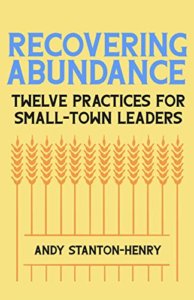Andy Stanton-Henry explains how the practice of gratitude can change the way we view our community and our world. For leaders, gratitude isn’t merely an essential personal spiritual practice. It is a way to promote the sustainability and resilience of their communities by shifting attention toward what is present and possible rather than what is absent and improbable.
One of the rituals that was consistent and nonnegotiable in my household growing up was saying grace before the meal. We call this ritual “saying grace” for a reason. The Greek word charis is translated both as “grace” and “gift.” When we “say grace” before a meal, we are affirming the grace at the heart of the universe and the many ways we experience that grace in “these thy gifts,” including the gifts of life-sustaining food, drink, and community. We cannot separate gratitude from grace. The practice of gratitude changes the way we view our community and the wider world. Indeed, we don’t just say grace, we learn to see grace.
Gratitude and transformation
I believe that anytime we practice gathering our resources, lifting them up, and giving thanks, we see them differently. We see them through the lens of gift and gratitude. Gratitude transforms our way of seeing people, places, and things. Before giving thanks, we look at what we have as products to be sold, purchased, or consumed. After giving thanks we look at what we have as gifts to be received, cherished, and stewarded. Before giving thanks, we look at what we have as few and less. After giving thanks we look at what we have bounty and blessing. What begins as a few loaves and fish becomes enough, more than enough — abundance. This is part of the transformation that happened through the leadership of Jesus in the story of the feeding of the five thousand (Mark 6:30-44).
Gratitude as resistance
Gratitude is in style. Everyone from new age gurus to neurologists are touting its many benefits for human well-being. While this trend is positive, it means we can easily dismiss gratitude as shallow. Some see it as a practice for the privileged, who count their coins and list their blessings at the expense of awareness of and advocacy for the underprivileged. Others point out that it can be a form of denial, allowing us to ignore our issues or injustices by focusing only on the positive. These are legitimate critiques. However, gratitude can also be empowering.
In a time of devastation and despair, gratitude allows us to reframe our perspectives on power and provision. When we notice goodness, truth, and beauty, even while we are surrounded by evil, lies, and ugliness, we insist that another world is possible. Domination and violence are not the only tools for changing the world, and they are not the only story about what is unfolding in the world. The practice of giving thanks reminds us that the ultimate Source and Provider is not the market, government, or human ingenuity but the Creator. Gratitude allows us to release fear and take up courage and compassion. In a culture of violent competition this is no small thing.
Gratitude as leadership
In the middle of the hangry and anxious crowd and coleaders driven by scarcity and competition, Jesus gave thanks. It was a public, prayerful, and prophetic act that shifted the atmosphere. This is a critical practice for leaders. Practicing gratitude in our personal life is important, to be sure, but it’s also an important act of community leadership. And it has many similarities with the practice of inventory. It’s about shifting the attention and energies of the group toward what is present and possible rather than what is absent and improbable.
Gratitude is a skillful leadership move. When we have a meeting and the group spirals down into scarcity thinking, we redirect the energy by asking the group to consider where there is life, energy, and possibility. Good leaders find ways to imitate Jesus by calling forth, collecting the resources, gathering the group’s gifts. Good leaders center the group around exercises of group gratitude. What are you grateful for? What has been going well? Where is there life and energy?
Leaders need to develop robust gratitude practices, not only to support their own mental health but for the sustainability and resilience of their communities. The skills that gratitude strengthens, such as managing stress, building social connections, and discovering possibilities, will become increasingly essential.
Researcher Robert Emmons tells us that focusing on gratitude in times of suffering and challenge may seem inappropriate, but it’s actually an essential practice. “In the face of demoralization, gratitude has the power to heal. In the face of brokenness, gratitude has the power to energize. In the face of despair, gratitude has the power to bring hope.”
 Reprinted with permission from Recovering Abundance: Twelve Practices for Small-Town Leaders by Andy Stanton-Henry, copyright © 2022 Fortress Press. The book is available from Fortress Press, Cokesbury, and Amazon.
Reprinted with permission from Recovering Abundance: Twelve Practices for Small-Town Leaders by Andy Stanton-Henry, copyright © 2022 Fortress Press. The book is available from Fortress Press, Cokesbury, and Amazon.
Related Resources
- Giving Thanks Faithfully by Ann A. Michel
- 9 Ways Generosity Leads to Healthier and More Purposeful Living by Ann A. Michel
- A Gracious Invitation to Generosity by Ann A. Michel
Image by freepik






